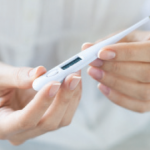I jot down her medical and social history on a separate yellow sheet: Depression treated with amitriptyline in 1984, mild asthma, chronic insomnia, divorce in 1985, two children ages 8 and 11, non-smoker, rare alcohol use. Let’s see: silicone breast augmentation in 1988, remarried in 1989, currently not working out of the home.
I flip to the tab titled Lab. Over the years, the majority of her lab tests were routine—the type of blood work one might draw for a yearly physical. Blood counts, thyroid studies, chemistry profiles, liver and kidney function: normal. Testing for Epstein-Barr virus, chronic hepatitis and HIV. Hmm, that’s a little out of the ordinary. Extensive viral testing is usually reserved for patients who feel unwell. They were drawn in 1986, two years before breast augmentation and then again in 1990. Normal and normal.
I scan down the tests evaluating Mrs. Morse’s markers for systemic inflammation—an erythrocyte sedimentation rate (ESR), normal at 17, and several C-reactive proteins (CRPs), one of which was borderline abnormal at 1.3 mg/dL (this was highlighted with a “!!!!” by the law firm in yellow marker).
The immunologic studies follow: A series of anti-nuclear antibody (ANA) tests were listed, several going back to the mid-1980s. I look these over more carefully. The presence of ANA may be associated with various autoimmune diseases, but they are not diagnostic of autoimmune disease. Numerous studies have documented that an ANA can be detected in the blood of patients with infection, with certain medications and, at times, in healthy adults. There were five ANA blood tests reported, two before Mrs. Morse’s breast implants in 1988, both negative, and three subsequently, only the last of which was positive at a low level. This was also boldly underlined in yellow with a comment: “SLE test positive.”
I take a closer look at the identifying lab information at the top of the sheet. The most recent positive ANA was performed at a specialty lab I was unfamiliar with in faraway Louisiana. That’s strange. There are plenty of good reference labs in Maine. If you want to be picky, the Mass General Hospital has an excellent lab for immunology. But to send a lab specimen all the way to Louisiana? Below the ANA were several additional tests assessing for the presence of antibodies against silicone. These were markedly positive, with an asterisk over the values. In fine print at the bottom of the page, a corresponding asterisk divulged “silicone antibodies are performed in house and have not been validated by an outside independent lab.” Next to the silicone antibody values was another breathless, yellow exclamation mark.
